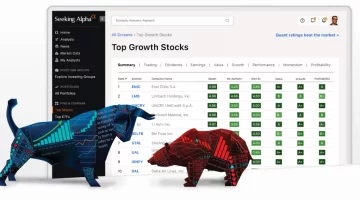How the Financial Services Industry Became Like a Slaughterhouse
The following is adapted from FOOLISH.
I remember being on a road trip with my family when I was around 12 years old. We were all getting hungry, but we were in the middle of nowhere. Eventually, we came across this stand-alone taqueria, and my brother and I begged my mom to pull over. We walked in, and it felt like an oasis. It smelled amazing.
I ran to the bathroom, and on my way out, I saw these cardboard boxes in the hallway that said, “Ground Beef. U.S. Canner.” I walked back out to the table, wondering what that meant. When my mom explained that canner beef is the cheap stuff, one notch above dog food, I wondered what had happened to my appetite. You’ll never see a restaurant promote the fact that they use canned meat. That’s because some things in life simply shouldn’t be for sale.
In the brokerage business, one thing that should never be for sale is the relationship between the broker and the client. But that is precisely what gets sliced up and monetized by the brokerage firms, even while they use the term “advisor” when referring to their brokers. Considering that trust is the ultimate measure of success in a relationship, it’s amazing what the brokerage firms are willing to sell that compromises that trust.
Too often, brokerage firms imply they’ll be your trusted advocates, when in reality, that couldn’t be further from the truth. But forewarned is forearmed, as the saying goes. I want you to be able to protect yourself from unscrupulous brokers who monetize your sacred trust; to that end, let’s take a look at exactly how the financial services industry became a slaughterhouse, and what you can do to protect yourself.
Who Protects the Investors?
If brokerage firms can’t always be trusted to do right by their clients, who looks out for the clients? Well, the Securities and Exchange Commission (SEC). The SEC is responsible for protecting investors.
Its job is not to ensure profitability but to make sure investors are not getting ripped off or defrauded. When individual investors are in harm’s way, the SEC is trusted to step in and make things right. And yet, ideas on how best to do that have changed over time, as the regulations reflect.
Prior to the Great Depression, the stock market experienced unprecedented gains, so much so that even the banks wanted in on the action. Banks used their customer deposits to invest in the market, more speculatively than wisely, and participated in investment banking operations (such as initial public offerings and mergers and acquisitions).
The sudden downturn in the stock market was devastating for banks, which at that time couldn’t allow customer withdrawals. The downfall of the banks wiped out the savings of the population and led to years of suffering for the American people. In the aftermath, Congress enacted the Glass-Steagall Act, which mandated the separation of commercial banking (checking and savings accounts, consumer loans) from investment banking, requiring banks to follow strict safety protocols with their holdings.
The following years established a fresh reputation for banking: banks were again highly regarded and highly regulated, and for many years largely unchanged. Banks existed to provide families and businesses an opportunity to earn a steady return in their savings accounts and to take out loans for their borrowing needs.
A Rise in Investing
As the economic policy of the ’70s and ’80s saw wild fluctuation in inflation and interest rates, investing in the stock market became increasingly popular. A sense of competition between banks and brokerage firms arose, and as a result, banks were motivated to come up with new products and new ways of doing things.
What was the solution? Ultimately, banks, brokerage firms, and insurance companies (the three prongs of financial services) started buying each other or merging.
In 1998, Smith Barney, Travelers Insurance, and Citicorp announced a merger into Citigroup. At the time, this move violated the Glass-Steagall Act, since this would again allow the threat of banks becoming “too big to fail” (when banks become so large and interconnected that their failure would be too catastrophic to allow).
Yet, Congress had conveniently softened up to the idea of allowing bigger financial firms to merge in mega-industry conglomerates and the time was ripe for repeal. The Glass-Steagall Act was replaced with the passage of the Gramm-Leach-Bliley Act, which helped lay the groundwork for the financial crisis of 2008.
Welcome to the Slaughterhouse
For big banks with oodles of FDIC-insured and leveraged cash, the repeal of the Glass-Steagall Act meant all bets were off. They set up performance bonus pools, essentially setting the dogs loose to sniff out extra profits. They also tried to mass-produce their client relationships and maximize the value in-between those lines, and they sure weren’t wanting to let anything fall through the cracks.
It sounds a bit like a slaughterhouse to me. At a slaughterhouse, there are systems designed to capture every little thing that could be usable after parts for human consumption are taken out. You name it, they use it.
Skin trimmings, hair, bones, and hooves are made into products for animal feed. Fat is rendered into tallow, which is used as a lubricant in steel rolling, and is oftentimes an ingredient in makeup and soap. Blood is in fertilizer. Feathers? You might find them in dog food and farm feed, too. The slaughterhouse makes money on the scraps, and frankly, they have a natural responsibility to do so.
So What’s the Problem?
The thing is, the people running the slaughterhouse never said they represented the interests of the animal. Not so on Wall Street. On Wall Street, your broker uses terms like “wealth management,” or “advisor,” or “practically fiduciary,” which leads you to expect a certain amount of allegiance.
Additionally, they have an incentive to maximize the embedded costs in the system, especially when they own all the layers of that system. Do you think they will refer you to a low-cost insurance policy when they own the one with higher costs and “better” commissions? Unless they’re registered as a “fiduciary,” they have no legal obligation to do so, and they won’t.
Your relationship with your “advisor” shouldn’t be monetized the same way as Beefmaster cattle. Yet it is.
What Can You Do?
So, is there a way to protect yourself? In short, yes. Make sure any financial advisor you work with accepts full fiduciary responsibility in your relationship. Ask them directly if they’re willing to do so. If they say no, you should probably keep looking. If they say yes, ask them to put it in writing on company letterhead. Again, if they balk, walk away.
When it comes to your hard-earned money, you deserve to work with someone who has chosen to be held to the highest standard and will advise you according to your best interest, not theirs.
For more advice on how to find a trustworthy financial advisor, you can find FOOLISH on Amazon.
Gil Baumgarten, one of the nation’s top financial advisors, is the Founder and President of Segment Wealth Management, an RIA financial advisory firm. Since its inception in 2010, Segment Wealth Management has grown to a top-ten firm in Houston, as recognized by the Houston Business Journal, with over a billion dollars in client assets under advisement. Gil is also a nine-time recipient of the Top 1,200 Financial Advisors distinction and has been ranked among the thirty-five best advisors in Texas by Barron’s. Distinctions aside, Gil’s affinity for precision and detail reveals itself in his daily life as well. He is an avid outdoorsman, award-winning woodworker, and attentive family man, friend, and colleague.
More to Read:
Previous Posts:








